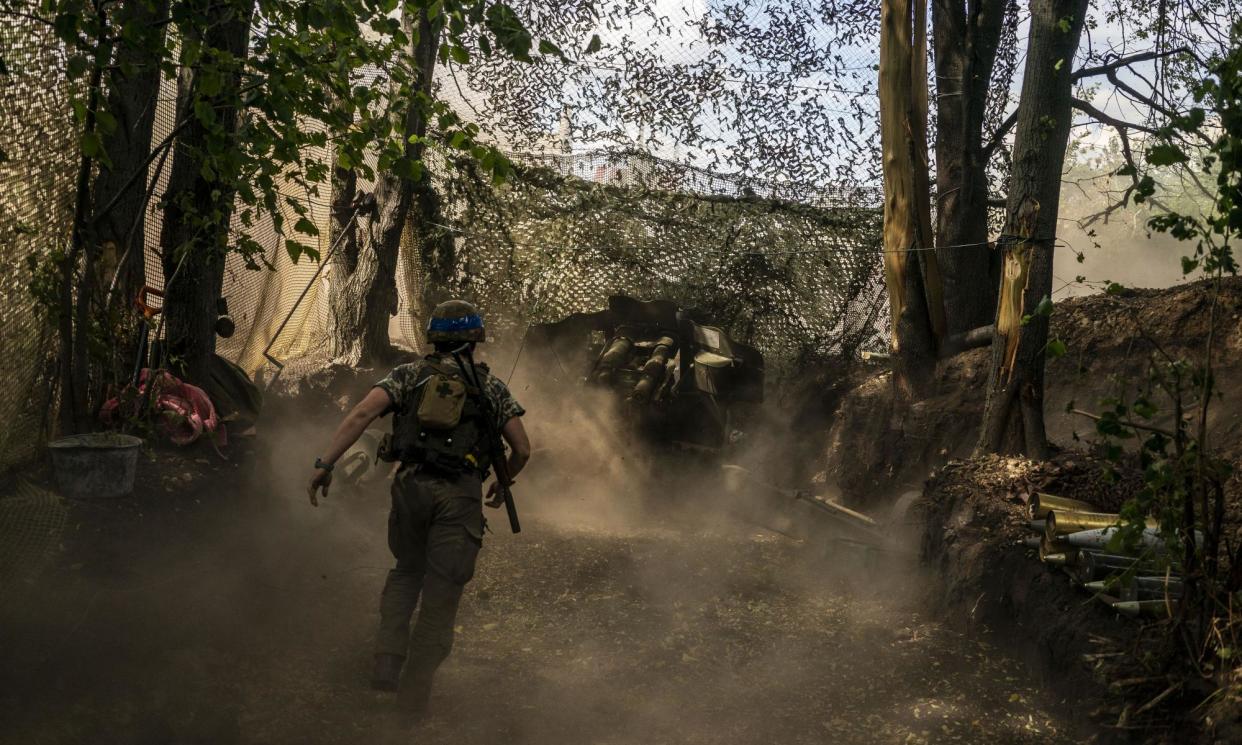Russian soldier says army suffering heavy losses in Kharkiv offensive

Anton Andreev, a Russian soldier from the fifth company of the 1009th regiment, painted a bleak picture of Russia’s offensive in the Ukrainian northern region of Kharkiv.
His unit had been decimated, he said, with only 12 out of 100 soldiers still alive as they came under constant Ukrainian fire and drones in Vovchansk, a prime target of Russia’s advances.
“They just chop us up. We are sent under machine guns, under drones in daylight, like meat. And commanders just shout ‘forward and forward’,” Andreev said in a video message.
Fighting has been raging near the city of Kharkiv since Russian troops crossed the border to open a new front on 9 May.
In the first week of the offensive, Russian troops seized about 99 sq miles of Ukrainian territory – some of its biggest gains in 18 months – raising serious questions about Kyiv’s ability to defend itself.
But Ukraine has been largely able to stabilise the front, alleviating immediate fears in the west that Moscow might be able to encircle Kharkiv, Ukraine’s second biggest city.
“I don’t know if I will get out of this or not, but I need to say this to honour the memory of those who died like meat here because of certain individuals,” Andreev said in the clip, which was first published by the Russian outlet Astra and verified by the Guardian.
Related: ‘Everywhere is dangerous’: Russia’s attacks on Kharkiv’s homes, shops and resorts
“You walk through the street, and everything seems to be fine,” he continued. “But then you get caught up in a massacre. During the first night, half the company immediately died.”
Russian state media and senior officials continue to say its troops are on the advance in the direction of Kharkiv. Putin has claimed that Russian losses were “of course several times less than on the Ukrainian side” and the Kremlin has also gone to great lengths to ensure that accounts such as Andreev’s are kept from the public.
Ever since Yevgeny Prigozhin’s aborted mutiny in the summer of 2023, Moscow has purged some of the leading nationalist voices who had been allowed to criticise the country’s war efforts. It has jailed Igor Strelkov, a popular nationalist blogger and former FSB officer who had become a vocal critic of how the Kremlin has handled the invasion, and last month authorities arrested Maj Gen Ivan Popov, a widely respected commander in Russia who brought up problems on the battlefield, including deaths and injuries the army was suffering from Ukrainian attacks.
The cohort of influential military bloggers now largely toe the government line, painting an upbeat picture of Moscow’s advances while predicting Ukraine’s immediate collapse.
But on social media, dozens of posts have sprung up with Russians searching for their missing relatives in the Kharkiv offensive, hinting at the staggeringly high number of losses Moscow continues to suffer.
Some relatives have criticised the minimal training troops reportedly received before the offensive.
“I haven’t heard from my brother since the 12 May when they were sent to Volchanks,” wrote Yevgeni, in one post on the social media platform VK. “I am concerned that the training was only a week. Is that even legal?” Yevgeni added.
Despite the mass casualties, overall support for the war in Russia remains high, driven partly by non-stop state propaganda and a lack of alternative viewpoints.
A survey published by the independent Levada pollster showed that 79% of Russians supported the Kremlin’s actions in Ukraine. However, half supported initiating peace talks, while almost 40% said they would prefer to return to the period before Moscow invaded Ukraine.
In a rare protest, a group of Russian women made up of wives of some of the 300,000 Russian men conscripted in September 2022, gathered this month outside the defence ministry in Moscow to demand the return of their relatives.
The authorities have recently stepped up their efforts to crack down on the movement known as the Way Home, designating the group as a “foreign agent”, a term that carries negative Soviet-era connotations of spying.
The Russian military leadership has also gone after the growing number of deserters.
The independent Russian news outlet, Verstka published a report that alleged Russia’s military abducted hundreds of mobilised soldiers unwilling to fight and sent them into the trenches at gunpoint.
Moscow has so far been able to replenish its troops without ordering a mass mobilisation by offering recruits generous wages and signing bonuses. It has been able to recruit about 30,000-40,000 soldiers every month, according to an estimate by the UK defence ministry.
Ukraine is facing a shortage of munitions, fighters, and air defences, and is also suffering mass casualties.
And while Russia’s offensive in Kharkiv appears to have stalled for now, the push has managed to achieve at least one of its goals: to draw Ukrainian critical reserves into the region, away from defensive positions in the east, as Russian forces have continued to advance on the eastern axes, signalling their commitment to pressing ahead and trying to take the entire Donetsk region.

 Yahoo News
Yahoo News 
